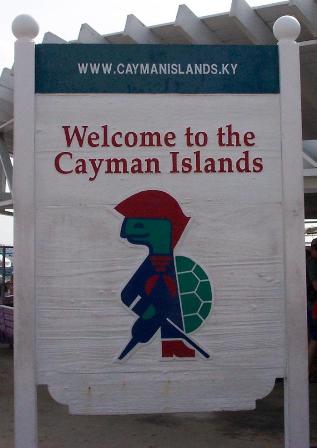Archive for August 19th, 2010

Young swimmer wraps up games with personal best
(CNS): Cayman’s young swimmer Lara Butler managed another personal best in Singapore yesterday. She finished the Woman’s 100m Butterfly in a time of 1:07.59 ending her debut appearance at the Youth Olympic Games on a high note. Butler said she was very pleased with her performance. Team mate Seiji Groome competed in the men’s 200m breaststroke where he had a strong first half but fell behind his personal best pace. Groome said he gained a lot of experience racing at this level and he is eager to get back in the pool to start training for World Short Course Championships in Dubai this winter.
Meanwhile, Lizzy Wauchope is representing the Cayman Islands at sailing in the Byte CII dinghy against 31 other female sailors and after two days of racing she is currently in 26th place overall. Although Wauchope has improved her boatspeed and boathandling over the last few months, her relative inexperience racing in big fleets is causing her problems on the race course she admitted. "I am struggling with finding room on the start line and getting clean wind early, causing me to play catch up for the rest of the race," she said.

Tourism officials aim to improve visitor experience
 (CNS): Following the news that cruise ship calls to Grand Cayman will be cut by twenty-five percent next year, the Department of Tourism has announced plans for an enhanced experience at the port. The DoT says the plan has been devised based on responses from a survey conducted among visiting passengers earlier this year. The announcement also comes as questions are being asked about the long term partnership with government and Dart to develop cruise berthing facilities. A three month MOU signed between the parties on 15 April has now expired, though government said on Thursday that the project is still on track.
(CNS): Following the news that cruise ship calls to Grand Cayman will be cut by twenty-five percent next year, the Department of Tourism has announced plans for an enhanced experience at the port. The DoT says the plan has been devised based on responses from a survey conducted among visiting passengers earlier this year. The announcement also comes as questions are being asked about the long term partnership with government and Dart to develop cruise berthing facilities. A three month MOU signed between the parties on 15 April has now expired, though government said on Thursday that the project is still on track.
In the meantime, tourism officials are implementing a plan to improve service delivery as well as the port’s physical environment. Jointly forged by the Department of Tourism, the Port Authority of the Cayman Islands and the Cayman Cruise Industry Partners, the six-month improvement project will be carried out over the rest of this year.

Unconscious Christians
Christians have many friends who do not believe in God, and they often wonder to themselves, “Will these friends go to heaven?” It is a very important question that needs a satisfying answer. Will many of our friends who are both agnostic and even atheist be in heaven? When we look to Scriptures and use our minds, we see that the answer is ‘Yes’.
These people will indeed be in heaven. This is because they are actually Christians, they are just unaware of it. They are ‘unconscious Christians’.
They are probably not aware of it because I do not think that even Christians are really aware of it. There is one criterion by which one loves Christ and that is loving your neighbour. Whether you have faith in Jesus or not, if you love your neighbour, you ipso facto love Christ. It is one and the same. Many atheists and agnostics love their fellow human beings and do not discriminate or treat anybody unfairly, regardless of where they come from. Such ‘unconscious Christians’ are people who do not intellectually accept Christ, but effectively, they do. They love Christ through their hearts, if not their minds. They love their neighbours, and thereby love God.
This is confirmed in Scriptures. When Jesus is asked by a scholar of the Law, “Teacher, which is the greatest commandment in the Law?" he answered by saying, “Love the Lord your God with all your heart and with all your soul and with all your mind. This is the first and greatest commandment. And the second is like it: Love your neighbor as yourself.” (Matthew 22: 36 – 39). Asked to name one law, Jesus instead named two. He says of the first commandment (loving God), that the second (loving your neighbor) is like it. He equated one with the other, so that we know that by loving our neighbour we thereby love God. This is why Scriptures also says “If anyone says, ‘I love God,’ yet hates his brother, he is a liar.” (I John 4: 20).
Logically, the concept of an ‘unconscious Christian’ makes sense because we know that human beings are made in the “image and likeness” of God. The human being alone among all creatures on earth is a self-conscious person. We are replicas of God, who is the eternal self-conscious Person. So because every human being is a replica of God, it follows that if you love human beings, you love God. This all makes sense.
Now in Scriptures, Jesus spoke about ‘unconscious Christians’. On the last day, when he is standing as judge before the throng of humanity, he says to those who are to partake in heaven, “Come, you who are blessed by my Father; take your inheritance, the kingdom prepared for you since the creation of the world. For I was hungry and you gave me something to eat, I was thirsty and you gave me something to drink.” We recognize the ‘unconscious Christians’ by their reply, “Lord, when did we see you hungry and feed you, or thirsty and give you something to drink?” They are genuinely surprised. They did not recognize Christ in this life. But Jesus says to them, “I tell you the truth, whatever you did for one of the least of these brothers of mine, you did for me.” (Matthew 25: 31 – 40). These people did not recognize Christ but they loved him nonetheless. So here we see ‘unconscious Christians’ going to heaven.
Now this view of things makes sense to our consciences and our minds, because we know that God is not a ridiculous and absurd God who would punish to all eternity someone who never heard about him. God is all loving, all embracing, and there are many sinners who will be in heaven (Matthew 22: 32).
Another criterion by which one loves Christ is to love life (in all its forms). Jesus said, “I am the resurrection and the life” (John 11: 25). All life that has ever existed on earth or in the entire universe was raised into being by Christ. All plants, trees, bugs, dogs, birds, and humans find their existence because of Christ. He is “the firstborn of all creation” and “by him all things were created” (Col 1: 15 – 16). Jesus is the person of God whose omnipresence sustains the whole of creation. “He is before all things, and in him all things hold together” (Col 1:17). So, generally speaking, if one loves life, one loves Christ. And by this criterion, we see that many people who do not believe in God nevertheless love God. These people want to protect the earth, and keep it free from destruction, so they can hand it down faithfully to their descendents. For them all life is precious, and beautiful. They do not think this way because God has told them in Scriptures, but because he has told them in their hearts. They do not recognize God in Scriptures, but by definition, they are Christian. By loving their neighbours and loving life, they love all things Christ, though they know it not to be him.
There are two things that a Christian should take from all of this. The first is that loving God is not just assenting to Christ intellectually, i.e. having faith. You have to DO something. Remember the story of the Good Samaritan. You have to love, with a real and passionate love, like Christ, who thirsted for love (John 19: 28). For, St Paul verily warns us that if you have “a faith that can move mountains, but have not love” you are nothing. You are “a resounding gong or a clanging cymbal.” (I Corinthians 13: 1 – 2). Ouch.
The second thing to realize from this is that only a Christian can love and believe in life with complete interior freedom. Christians have a truth that sets them free. An ‘unconscious Christian’ has to deal with this troubling issue: if the energy of the sun (and the entire universe for that matter) will one day dissipate, and all life die, what is really the point in loving my neighbour? Why not get what is good for me while I can? One who knows in the back of their minds that one day the earth will fail to be here can be tempted to be an anarchist, in the strictest and pejorative sense of the word. A Hitler. An anti-Christ. Life is absurd. A Christian, on the other hand, knows the effect of the cause. Loving each other will one day bring the earth to completion. Long before the sun fades away, humanity’s love for itself will intensify until it culminates in the love of God, and the New Jerusalem will descend from heaven, and God will “be all in all” (I Corinthians 15: 28).

Judge offers support for court room alternative
 (CNS): The introduction of mediation services to the Cayman Islands could add a new string to the country’s financial services bow, a leading expert in the field has said. Jonathan Dingle of the London School of Mediation visited Cayman this week to promote the idea that the jurisdiction could offer an alternative to the courtroom to resolve some commercial and civil disputes. At a special reception on Monday evening, recently appointed judge of the financial court, Sir Peter Cresswell offered his backing to the concept of mediation. Speaking in his personal capacity, the judge said that by offering mediation services Cayman could enhance its standing as a regional leader and centre of excellence.
(CNS): The introduction of mediation services to the Cayman Islands could add a new string to the country’s financial services bow, a leading expert in the field has said. Jonathan Dingle of the London School of Mediation visited Cayman this week to promote the idea that the jurisdiction could offer an alternative to the courtroom to resolve some commercial and civil disputes. At a special reception on Monday evening, recently appointed judge of the financial court, Sir Peter Cresswell offered his backing to the concept of mediation. Speaking in his personal capacity, the judge said that by offering mediation services Cayman could enhance its standing as a regional leader and centre of excellence.

Cayman needs to enforce building codes says insurer
 (Bloomberg): Climate change may add 50 percent to the storm damage costs incurred by some Caribbean nations over the next two decades, said Swiss Reinsurance Co., the world’s second-largest re-insurer. Wind, storm surges and inland flooding already cost some Caribbean nations up to 6 percent of their economic output each year. Global warming could add costs amounting to another 1 to 3 percent of output by 2030. Swiss Re said territories have a range of options open to them to reduce the risk of damage. The Cayman Islands could “cost-effectively avoid up to 90 percent of expected losses” by building sea walls and enforcing construction codes, the re- insurer said.
(Bloomberg): Climate change may add 50 percent to the storm damage costs incurred by some Caribbean nations over the next two decades, said Swiss Reinsurance Co., the world’s second-largest re-insurer. Wind, storm surges and inland flooding already cost some Caribbean nations up to 6 percent of their economic output each year. Global warming could add costs amounting to another 1 to 3 percent of output by 2030. Swiss Re said territories have a range of options open to them to reduce the risk of damage. The Cayman Islands could “cost-effectively avoid up to 90 percent of expected losses” by building sea walls and enforcing construction codes, the re- insurer said.
Value of wastewater secret
(CNS): Despite the fact that government has been trying to sell the Water Authority’s wastewater operations, officials have refused to reveal how much it is worth. A freedom of information request by a member of the public asking for the independent valuation conducted by KPMG of the government’s sewage treatment plant and other assets has been turned down. The request was made in April, several months before the government’s announcement that it now intends to lease the entire Water Authority operations and not just wastewater. According to the offering memorandum published by HSBC for the government’s recent bond sale, the book value of the sewerage treatment plant at the end of the 2009 financial year was US$23.3m.

Gun man robs gas station
 (CNS): George Town detectives are appealing for witnesses in the latest armed robbery which took place last night. At around 10:25 (Wednesday 18 August) a single gun men entered the Esso Service Station at the junction of Shedden Road and Thomas Russell Way in George Town. The man who was armed with what appeared to be a handgun entered the Gas Station threatened the employees and ordered them to put the cash in a bag and escaped on foot. He left the premises with a sum of money and was last seen walking on Printer’s Way. The suspect is described as being 5′ 9” tall, dark-brown complexion with a round face and clean shaved; he spoke with a Jamaican accent.
(CNS): George Town detectives are appealing for witnesses in the latest armed robbery which took place last night. At around 10:25 (Wednesday 18 August) a single gun men entered the Esso Service Station at the junction of Shedden Road and Thomas Russell Way in George Town. The man who was armed with what appeared to be a handgun entered the Gas Station threatened the employees and ordered them to put the cash in a bag and escaped on foot. He left the premises with a sum of money and was last seen walking on Printer’s Way. The suspect is described as being 5′ 9” tall, dark-brown complexion with a round face and clean shaved; he spoke with a Jamaican accent.
He was wearing a brown T shirt, black short pants, black shoes and black glasses and had on a black cap.
No shots were fired and no-one was injured in the incident. Police have not said if the gas station was using CCTV.